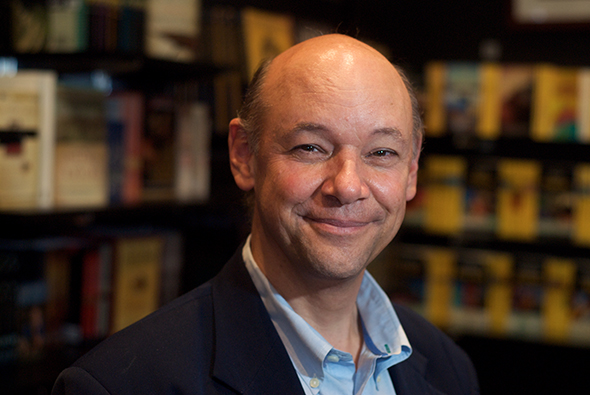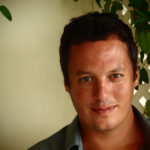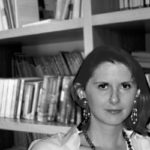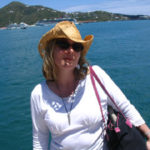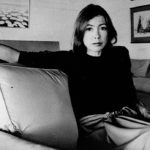Don George is the Global Travel Editor for Lonely Planet Publications. His new book, Travel Writing, will be published this month. In 25 years of wandering, Don has visited more than 60 countries and has published more than 600 articles in newspapers and magazines around the globe. He has also edited four travel anthologies — The Kindness of Strangers, A House Somewhere: Tales of Life Abroad, Salon.com’s Wanderlust, and Travelers’ Tales: Japan. Don often appears as a travel expert on radio and television, and speaks on travel writing and travel industry issues around the world. In addition to his editing and spokesperson duties for Lonely Planet, Don writes a weekly travel advice column for LonelyPlanet.com, entitled “What Would Don George Do?“.
How did you get started traveling?
My family used to take a car trip somewhere every summer from our Connecticut home — North Carolina, upstate New York, Nova Scotia. My parents loved to travel and passed their love on to me. The summer between my sophomore and junior years in college, my family took my brother and me to London and Paris. The next summer, I went to Paris on my own on the Princeton Summer Work Abroad program. I lived with a family in the 16th arrondissement, bumbled and stumbled through daily life using my college French and had many wonderful adventures with many wonderful new French friends. That was just the beginning. The next summer, after graduation, I lived again in Paris on the same program, then moved to Athens, Greece, for a year on an Athens College Teaching Fellowship. The rest is wanderlust.
How did you get started writing?
I started writing poetry in high school, was the editor of my school’s literary magazine and developed a thick file of tiny cream-colored square rejection notes from the poetry department at The New Yorker. Though I majored in Princeton’s comp lit/English program, I took a number of poetry writing workshops through the creative writing program, and when I went to France/Greece for that year after graduation, I was torn between wanting to be a poet and wanting to be a professor. The professorship was the easier default route, but something kept tugging me toward poetry. Finally it all came to a head one sleepless spring night in Athens, when I had to decide between graduate school programs in comparative literature and creative writing. By morning I knew I had to follow my heart and choose creative writing.
What do you consider your first “break” as a writer? As an editor?
My career has advanced through a series of serendipitous breaks. My first break, in a sense, was winning the fellowships that allowed me to go to France and Greece — a year of travel adventures that provided extensive material for stories in later years, and sowed the seeds of many adventures to come. But my first publishing break as a writer was after I finished that masters program in creative writing (at Hollins College in Virginia — a most wonderful program!) and then, still prone to career-procrastination, won a two-year Princeton in Asia fellowship to teach at a university outside Tokyo.
A couple of months before I was to depart for Japan, I wrote earnest letters to numerous East Coast magazines saying that I was going to live in Tokyo for two years and would be pleased to be their Japan-based correspondent. The Atlantic Monthly, Harper’s, Time and many others wrote back saying thank you very much but actually we have a few people based in Japan already. Astonishingly enough, however, editors at The New Yorker, Travel & Leisure and Mademoiselle added notes saying that if I was planning to be in New York before I left for Japan, they would be happy to meet with me.
So I immediately invented a trip to New York and wrote back saying thank you very much for your note and in fact I am planning to be in New York from x to y and as you suggested I would love to stop by and meet you and when would be convenient for you? I met with editors at the three magazines, and as part of each visit, I handed over a copy of my graduate school piece on climbing Mount Kilimanjaro (from a non-fiction workshop) as a writing sample. I went back to Connecticut, packed for two years in the Oriental unknown, and two weeks later went off to Japan. When I arrived at my campus apartment in a suburb of Tokyo, a telegram was waiting for me. It was from Mademoiselle and it said: ‘Dear Don: A hole opened up in our November issue and we put your Kilimanjaro story in it. Hope you don’t mind.’ That was my first great break as a writer.
My first break as an editor also eventually occurred because of this fellowship in Japan, but to get the whole long and winding tale, it’s best to read one of my lonelyplanet.com columns, entitled “How I Became a Travel Writer.”
To make that long story short, here’s the extraordinarily serendipitous saga: I was spontaneously invited on a press trip to Japan, on which I met a writer who was friends with the travel editor of the San Francisco Examiner. The travel editor was planning to take a year off and called this writer to ask if she would like to do the job for a year, and she said she couldn’t but had just met this nice young man who had just moved to the Bay Area and might be perfect for the job. Without any knowledge that this phone call had transpired, half an hour later, I called the travel editor to inquire about the status of a story I’d sent her, and she said, “‘I don’t know anything about your article, but I’m very glad you called. I’ve just been talking with someone about you, and I’d really like to meet you.” We met and hit it off, and after I’d interviewed with what seemed like everyone at the paper, I was hired to take her place for a year. And my life was absolutely and ineluctably transformed, just like that.
As a traveler and fact/story gatherer, what is your biggest challenge on the road?
For almost all of my professional life, I have been uniquely blessed by the fact that, as a writer, I have had a singularly understanding and supportive editor: me. So, except when I have been writing for magazine editors, my “assignments” have usually been along the lines of — go to Fiji and find out what’s so great about it. I frame a story somewhat before going — I plan my itinerary, so I know roughly where within the destination I will be and for how many days — but when I get on the plane, in most cases I don’t know what the story is. So I would say that my biggest challenge is finding the story. In this case I have to be careful that the quest for the story — the desperate looking around to figure out what the story is, quick! — doesn’t get in the way of enjoying a place deeply and trying to get to its essence. But I’ve learned to trust my instinct, follow my curiosity, and in a sense let the story reveal itself to me. Which it always does — or at least, always has so far.
What is your biggest challenge in the writing process?
My biggest challenge as a writer is a refined version of finding the story. As I’m traveling, a narrative begins to take shape in my mind — certain themes come to the fore, characters and experiences that relate to those themes stick out. So I’m on a trail and I’m loosely following it and I think, “This is all leading somewhere. I think the story’s taking shape.” But then I get home and I gather all my notes and photos and brochures around me, and I think, “So — what’s the story?” That’s when I have to sift through all the experiences and conversations and thematic threads and get down to the core of the experience for me: What’s my Fiji story? What did I learn? That’s the biggest challenge for me — refining and refining and refining, focusing and focusing and focusing my sense of the trip until I’ve got it down to one quintessential lesson — which I then have to explore, evoke and expand so fully that it comes to embody the color and character and very essence of the place I visited.
What is the biggest challenge as an editor?
There are two challenges for me as an editor. One is liberating writers to do their best work. Many editors, or many publications, have a template they expect writers to adhere to — in subject matter and approach and voice. I have always found that my greatest success as an editor comes when I get the writer to tap into some place in their lives — some great experience — that they haven’t had a chance to tell the way they really want to tell it. Stories full of passion and wonder and wisdom — and really great writing — result.
The other tremendously enjoyable challenge as an editor — whether of a weekly travel section or a book-length collection — is to create a picture-puzzle and then put together all the pieces of that puzzle. The puzzle has to fit thematically, geographically, tonally; it’s a vast and intricate balance, but when you get it right, it’s really exhilarating.
Have you ever done other work to make ends meet?
Remarkably enough, no. After I went to work for the Examiner, 25 years ago, travel writing and editing have been my only professional work. I also teach writing workshops, but that’s for fun and to renew my sense of wonder. One of my great joys in this regard is that my travel writing/editing work has actually allowed me to expand other skills and interests, especially in my current job: I now do a great deal of TV and radio work, which I love; and I give speeches around the world, which I also love.
What travel authors or books might you recommend and/or have influenced you?
First of all, I think a thorough grounding in English, American and French literature has been a great help to me, so before focusing on travel writers, I would very strongly recommend that budding travel writers read, read, read and read some more — not just travel writers but great fiction writers and poets too. In some ways my most profound influences were James Joyce and William Butler Yeats, TS Eliot and Charles Baudelaire, Hemingway and Fitzgerald.
But as for travel writers: My favorite book of all is The Snow Leopard, by Peter Matthiessen, a masterful combination of intensely personal exploration and intensely vivid description, infused with a searing, soaring humanity, spirituality and intelligence. Also on the list, in no particular order: Paul Theroux, especially The Great Railway Bazaar; Bruce Chatwin, In Patagonia; John McPhee, Coming into the Country; Annie Dillard, Pilgrim at Tinker Creek; Pico Iyer, Video Night in Kathmandu; Tim Cahill, Pass the Butterworms; Jan Morris, Journeys (just about anything by Jan Morris is transcendent, but Journeys is a good place to start).
As an editor, what do you look for in a travel story?
I look for passion, coherence and a compelling narrative shape. And perhaps most fundamental of all, I look for a story that knows what it’s about, what its main point is. I also look for strong characters, brisk dialogue, thoughtful writing — I admire stories that vividly evoke an experience and then put that experience into a larger context.
What advice and/or warnings would you give to someone who is considering going into travel writing?
Read my new book! (Buy one copy for yourself and one for your best friend, then both of you can convince your next writing workshop teacher to make it an assigned text. And thank you!!!) Actually, everything I have to say on this subject is in the book, and it took a book to contain it all….so, well, read my book!
What is the biggest reward of life as a travel writer and editor?
That will be the subject of my next book! But to begin: You get to explore the planet, you get to immeasurably widen and deepen your worldview, you get to continually reassess and stretch yourself, you get a sense of balance and perspective, you get a deeper appreciation of raw nature and of human creation and aspiration, you make friends around the world, and you learn humility and vulnerability and love….
And that’s all in addition to the little cakes of soap and bottles of shampoo!

